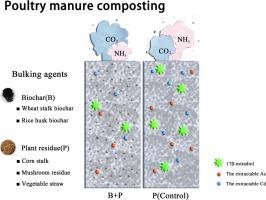Waste Management ( IF 8.1 ) Pub Date : 2021-06-10 , DOI: 10.1016/j.wasman.2021.05.037 Fengsong Zhang 1 , Zhuo Wei 2 , Jim J Wang 2

|
Inadequate handling of poultry manure can cause significant releases of NH3, heavy metals, and estrogen, thereby impairing environmental quality. This study was a composting experiment involving the combination of poultry manure with plant residues (corn stalks, mushroom residues, and vegetable straw), as well as with either wheat stalk biochar (WB) or rice husk biochar (RB). The integrated effects of plant residues and biochar on NH3 loss, heavy metal (Cu, Zn, As, and Cd) stabilization, and 17β-estradiol (E2) dissipation were investigated during composting. The poultry manure co-composted with corn straw and mushroom residue showed the highest potential for E2 degradation. Biochar enhanced E2 dissipation and decreased estrogenic activity in all treatments, with RB showing a stronger effect than WB. Both biochars decreased microbial diversity and increased bacterial groups related to E2 and organic matter degradation·NH3 emission was reduced by 50–82% with 15% WB and 86–97% with 15% RB. The extractable fraction of As was reduced by 0–53% with WB and 50–84% with RB, while that of Cd was reduced by 5–28% for WB and 25–41% for RB in poultry manure compost. However, biochar showed little effect on Cu and Zn. Biochar appears to have a promotional effect and enhances the microbial degradation of E2. Specifically, the integration of corn stalks, mushroom residues, and RB in poultry manure compost had a positive effect by preventing nitrogen loss while reducing the bioavailability of heavy metals and hormones.
中文翻译:

生物炭与植物残渣综合应用对家禽粪便堆肥过程中氨损失、重金属固定化和雌激素耗散的影响
家禽粪便处理不当会导致NH 3、重金属和雌激素的大量释放,从而损害环境质量。本研究是一项堆肥实验,涉及将家禽粪便与植物残留物(玉米秸秆、蘑菇残留物和蔬菜秸秆)以及小麦秸秆生物炭 (WB) 或稻壳生物炭 (RB) 结合使用。植物残体和生物炭对NH 3的综合影响在堆肥过程中研究了损失、重金属(Cu、Zn、As 和 Cd)稳定性和 17β-雌二醇 (E2) 耗散。与玉米秸秆和蘑菇残渣共同堆肥的家禽粪便显示出最高的 E2 降解潜力。Biochar 在所有处理中增强了 E2 耗散并降低了雌激素活性,RB 显示出比 WB 更强的效果。两种生物炭都降低了微生物多样性,增加了与 E2 和有机物降解·NH 3相关的细菌群15% WB 和 15% RB 的排放减少了 50-82% 和 86-97%。在家禽粪便堆肥中,使用 WB 可提取的 As 部分减少了 0-53%,使用 RB 减少了 50-84%,而使用 WB 减少了 5-28% 的 Cd,使用 RB 减少了 25-41%。然而,生物炭对铜和锌的影响很小。Biochar 似乎具有促进作用并增强了 E2 的微生物降解。具体而言,将玉米秸秆、蘑菇渣和 RB 整合到家禽粪便堆肥中,通过防止氮流失,同时降低重金属和激素的生物利用度,产生了积极的效果。


























 京公网安备 11010802027423号
京公网安备 11010802027423号